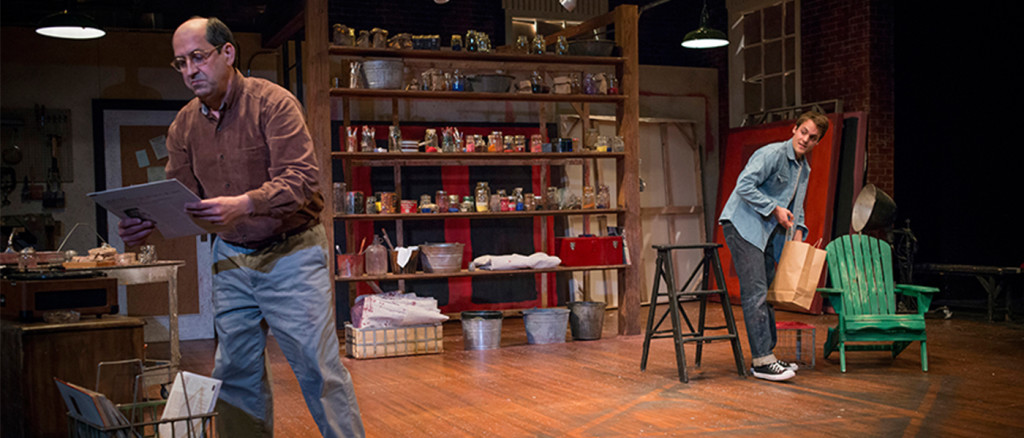“I am here to stop your heart: I am not here to paint pretty pictures.” So roars abstract expressionist painter Mark Rothko (David Studwell) in John Logan’s -award-winning drama Red, the season opener (through Saturday, June 21) at Ithaca’s Hangar Theatre. The time is 1958 to 1960, and Rothko has accepted a plush commission to paint murals for the upmarket Four Seasons Restaurant. Prestige counts more than money. To help with menial work, like stretching canvas over frames, Rothko hires an assistant, Ken (Paul-Emile Cendron). Despite being a working, 9-to-5 artist, Rothko has plenty of time to talk. He sees his job as 10 percent putting paint on canvas and the rest of the time spent waiting.
Although dressed by Gretchen Darrow-Crotty to look like a scruffy, bohemian modernist, Rothko sees himself as the heir of the grand western tradition: The artist must be civilized. He gets his juices going by listening to LPs of Bach, Schubert and Gluck. To prepare his mind for the plunge in art, Rothko demands that Ken read Nietzsche’s “Birth of Tragedy.” Rothko perceives his aesthetic is endangered. Just as he and his generation killed cubism, a new crowd championing comic books and Campbell soup cans lays in wait for him.
Red has demonstrated wide appeal to disparate audiences because it is also the conflict of two men, not unlike Peter Shaffer’s Amadeus. Ken, initially seen as an awestruck, trembling cipher, is himself an artist with a Big Family Secret. Under Jen Waldman’s direction we find our sentiments flowing toward Ken as he challenges the contradictions of Rothko’s overbearing bluster.
This does not mean Red does not belong to David Studwell’s Rothko. Playwright Logan, a frequent visitor to Rothko’s murals now in London’s Tate Modern, wants us to grasp the artist’s profound aspiration, much like Maria Callas in Terence McNally’s Master Class. Studwell and director Waldman lend this added dimension to the character, who understands the paradoxes and even contradictions on his position before Ken confronts him with them.
Red marks the debut of new artistic director Jen Waldman. The bracing tension and crackling wit seen here bode well.
For more reviews like ‘Brush Hour for Hangar’s Season Kickoff’ — CLICK HERE


